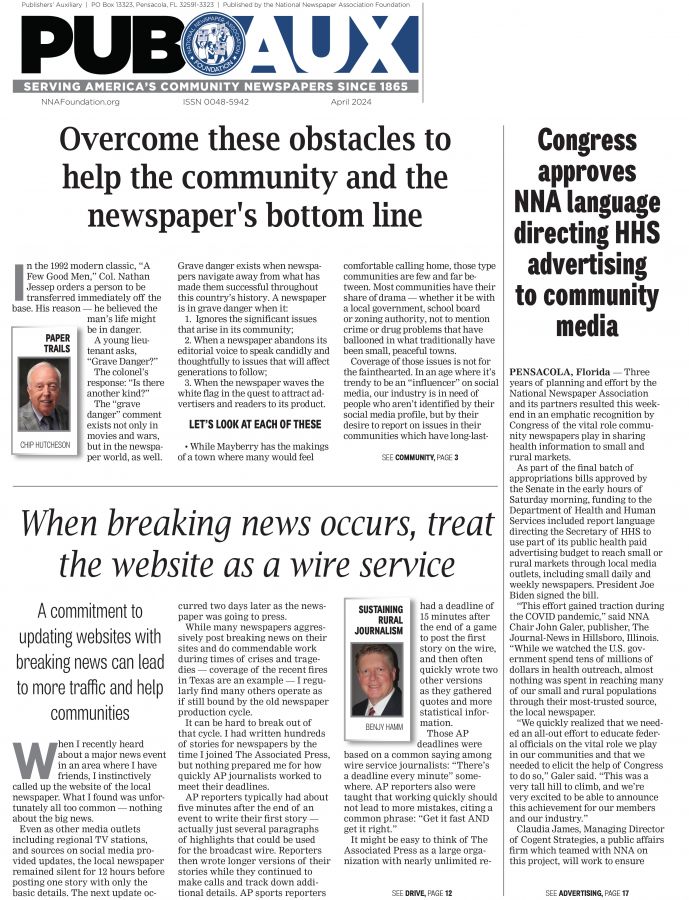Tough decision ahead for all on ‘shield law’ definition
Sep 26, 2013
By Gene Policinski
Inside the First Amendment- Sept. 26, 2013
We’re all facing a tough decision by Congress later this year – and it’s not about the federal budget or national health care policy.
A question that ultimately will affect us all involves a bill with the innocuous name “Free Flow of Information Act.” In other words, it’s a proposal to create – for the first time legislatively – a national “shield law” aimed at protecting news sources and the confidential information they have provided from having to be disclosed by journalists facing a subpoena or federal grand jury.
Note that that description, unlike most, starts out by referring to the protection that sources get under the proposal, not the benefit that derives to journalists.
From a First Amendment view, that’s about the only way one feel comfortable with such a law. The major hurdle that remains is that the measure must include a definition of a “journalist,” which by-definition must exclude some of our fellow citizens or it would read “everyone.” But the 45 words of the First Amendment have no modifier in front of “press” in forbidding government from restraining or censoring what it publishes.
Advocates of the bill have come a long way over several decades from legislation to include as many as they can in this latest proposal. Earliest versions – a product of their pre-Internet times as well as some institutional mindset -- focused just on traditional ideas of who is a journalist: Employees of major news companies or publications, or those whose income is principally from journalism. Left out were journalists for student publications, along with newer groups like bloggers, aggregators and Tweeters.
Even some early proposals this time around left some in those same groups potentially without the means to pledge anonymity to their sources. But amendments Sept. 12 in the Senate Judiciary Committee have addressed those problems, supporters say, partially by including students and freelance writers, and by including a “catch-all” provision that permits a federal judge to say the law applies to anyone who the judge deems to be acting “in the public interest.”
Critics of the bill, which has bipartisan support, say that despite these changes, the bill doesn’t provide protection to enough people, enough of the time, to override concerns that by defining who is a journalist it is a back-door exercise in, in effect, “licensing” journalists for the first time.
The bill includes some non-controversial exceptions, such as where the information disclosed directly involves an act of terrorism, death, kidnapping or bodily harm. But then it attempts to define and exclude groups like “Wikileaks” and individuals such as former NSA analyst Edward Snowden, which have dumped wholesale lots of classified information onto the Internet.
Along with spies and terrorists, they and their sources are not protected. And, veteran journalist Scott Armstrong said Sept .18 in a panel discussion at the Newseum, neither will be the reporters who need it most: Those reporting on national security matters regularly.
“It won’t protect us,” Armstrong said, “We’re going to get exempted out of it one way or another.”
Others on the panel countered that having some chance at defeating a subpoena is better than nothing. But both advocates and critics have conceded along the bill’s progress that the possibility of losing such a fight – and the investigation and court proceedings it will entail – will at the least have a “chilling effect” on future sources.
Placing the focus on protecting the sources of a “Free Flow of Information” won’t solve the “who is a journalist” issue, but it may well make it less of a stumbling block – since the “how” a leak reaches the public would be subordinate to the “who leaked it” issue.
And with that orientation in mind, all of us can consider whether we want to protect the source – perhaps based on the idea of the larger benefit they are bringing to society, which is the basis for other such protections: priest-penitent, doctor-patient, lawyer-client, and such.
In each of those cases, an individual gets specific benefits from the confidentiality of the relationship- -- and society benefits indirectly by having such options available. Ironically, in the source-journalist equation, its society that gains first when the disclosures keep citizens informed about the policies, practices and sometimes-secret acts of government.
The Founders created such strong protection for a free press because they say its values to society: The open exchange of views and information, the senses of “community” created by common media and, of course, the watchdog role of independent journalists.
At times, reporters need confidential sources to get at stories that are hidden behind piles of paper, bureaucratic blunders or program hidden from the public. It’s there that the benefit of a “shield law” ultimately rests.
If a journalist gets a good story, or even wins an award, in the process – well, that’s well down into “secondary” effects calculation.
Gene Policinski is chief operating officer of the Newseum Institute and senior vice president of the Institute’s First Amendment Center. Contact him atgpolicinski@newseum.org.







